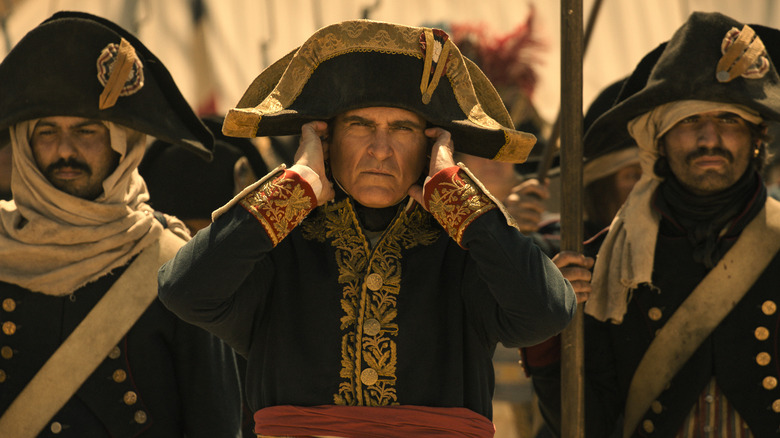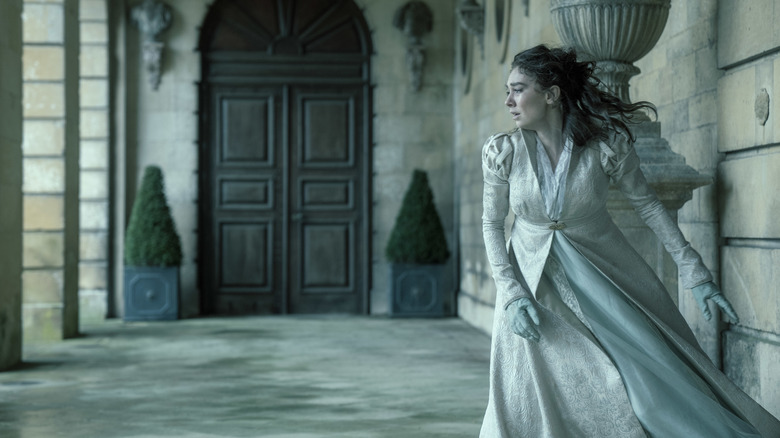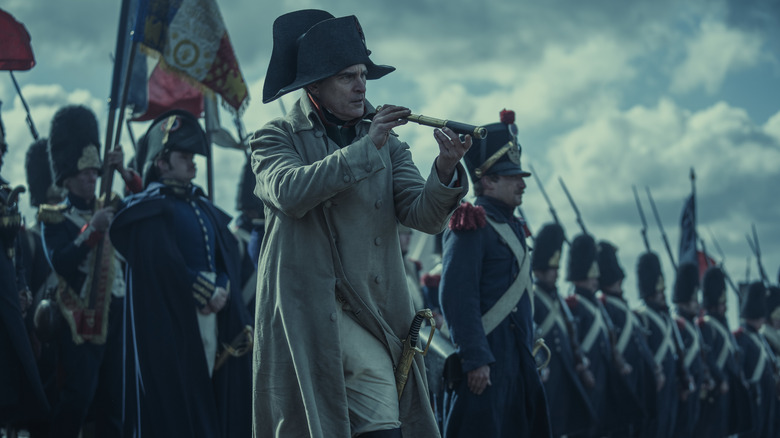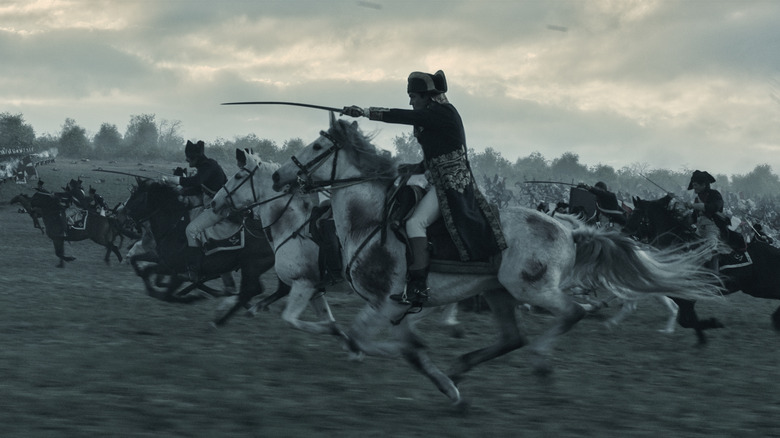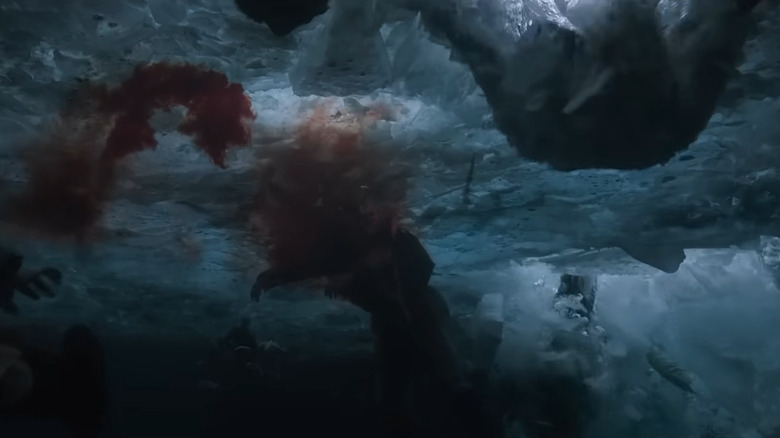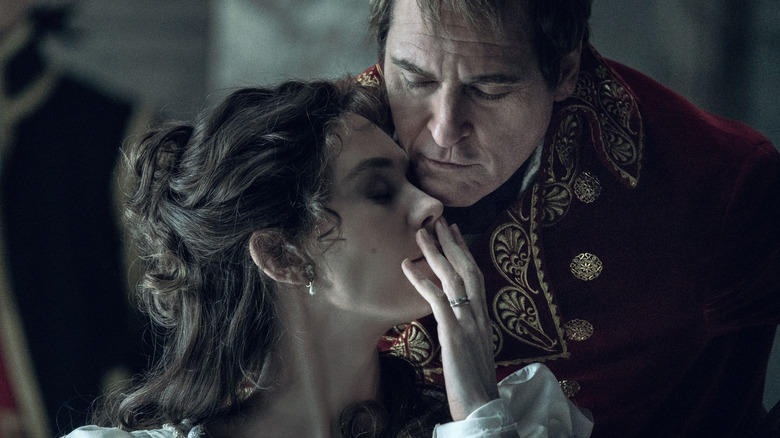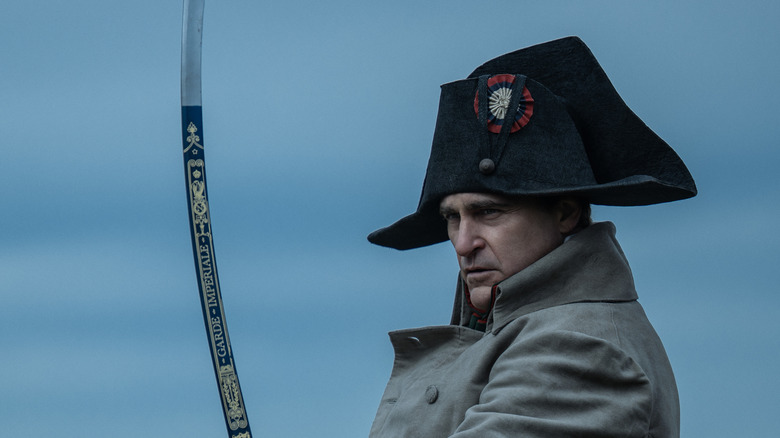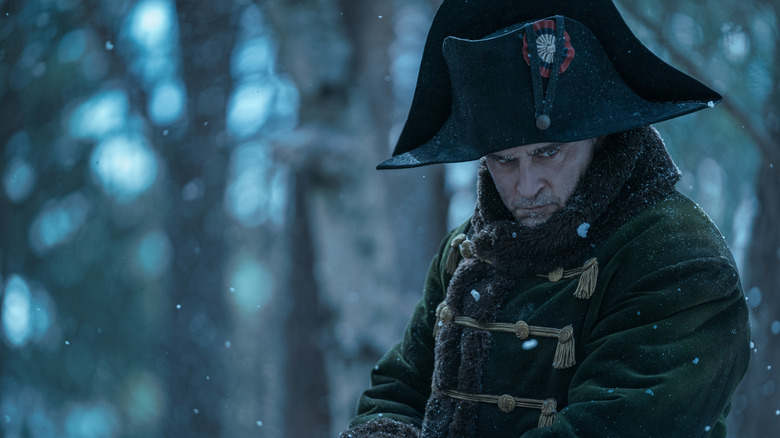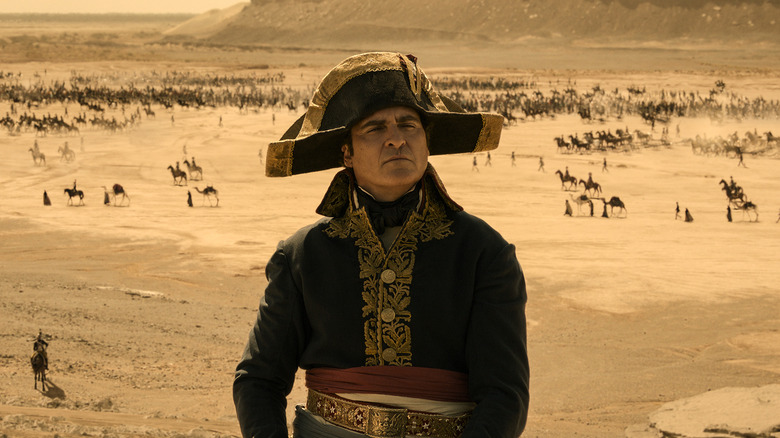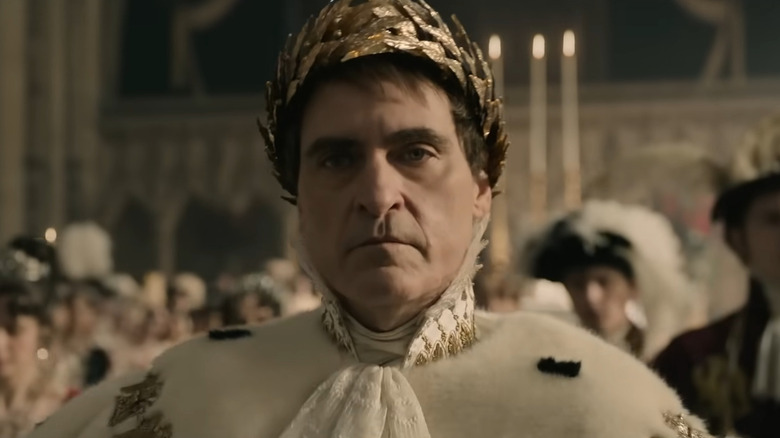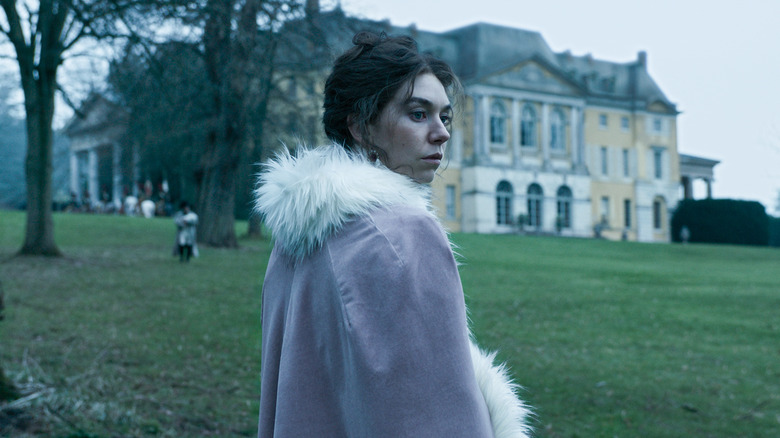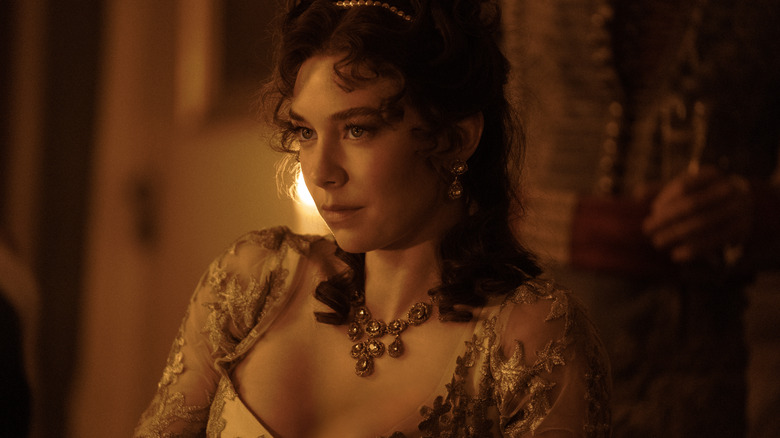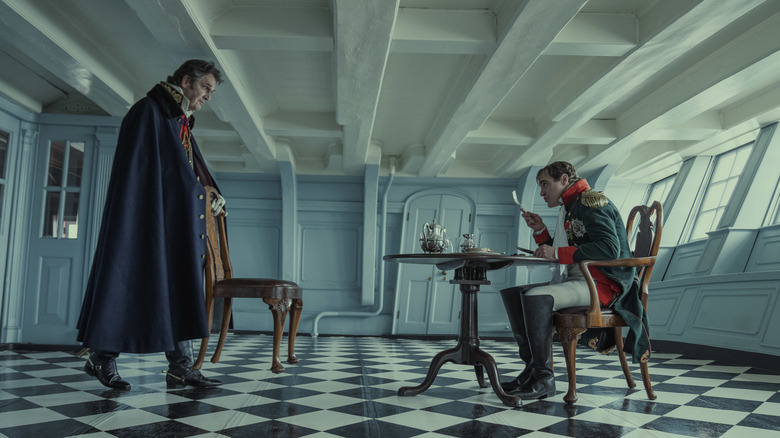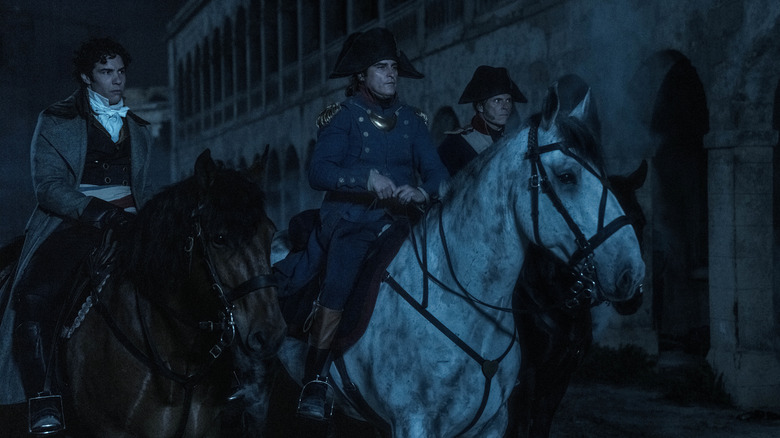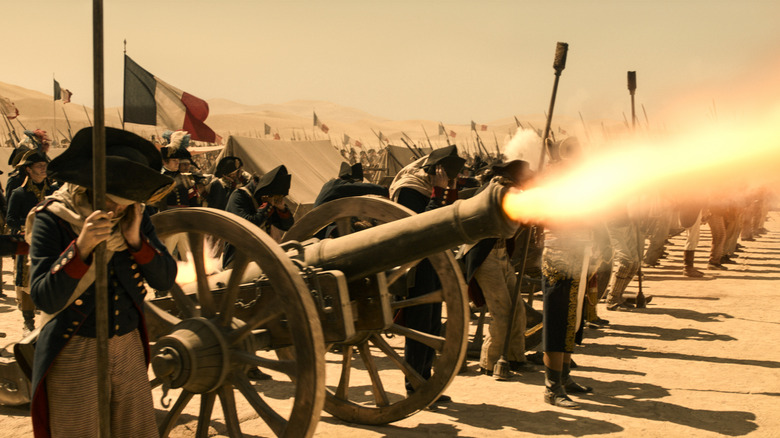14 Things Napoleon Gets Right And Wrong About The True Story
Do biopics, strictly speaking, need to be historically accurate? If you ask "Napoleon" director Ridley Scott, the answer is no. (Or, to put a finer point on it, he would say to "get a life," as he recently told a critic in The New Yorker who questioned how fastidiously the film adhered to reality.) Sure, when it comes to filmmaking, the truth should never get in the way of a good story, and besides, it may not even be a director's intention to tell the story of a person's life exactly how it happened. But a lot of moviegoers get their history from the cinema, and it's worth exploring where a film bends the truth or abandons it completely.
All biopics are guilty of using a little bit of creative license when it comes to the historical record, and "Napoleon" is no different. While it does attempt to cover the famous general-turned-emperor's entire military and political career in admirable detail, it also takes some liberties with the actual story. Read on to see where it sticks to the truth, and where it embellishes for cinematic effect.
Empress Josephine was imprisoned during the French Revolution
During the segments of "Napoleon" that deal with the Reign of Terror in the aftermath of the French Revolution, we see Josephine (Vanessa Kirby) with her hair shorn in an overcrowded prison filled with aristocrats. When the situation stabilizes and the more extreme revolutionaries are removed from office, she and the other prisoners are freed. Napoleon (Joaquin Phoenix) and Josephine first meet, in fact, at a victims' ball, which was held for those who had loved ones executed during the Revolution — her hair hasn't yet grown out from her time in jail.
The real-life Josephine de Beauharnais had in fact been imprisoned for several months in 1794, separated from her two children and her husband Alexandre, who was eventually guillotined in July 1794. She might have followed him to the same grisly end, but was instead released just a few days later, when Maximilien Robespierre was removed from office and swiftly executed as well. She met Napoleon a year later, which seems to generally match the timeline of their relationship in the film.
Napoleon actually rose precipitously through the ranks
The opening of "Napoleon" gives us the impression that Napoleon Bonaparte is a long-suffering foot soldier desperate for promotion but unable to receive it due to his foreign origins, having been born and raised on the island of Corsica. We see him angling for a promotion, one that he eventually receives as a result of his success at the Siege of Toulon. But although Napoleon was sneered at early in his career by snobbish elites (his accent gave him away as being from the backwaters that his wealthy French-born compatriots would have looked down upon), he actually rose through the ranks incredibly fast, especially for someone who spent large stretches of his military service on questionable medical leave in Corsica, as Andrew Roberts detailed in "Napoleon: A Life."
This was in part because the French army couldn't exactly afford to be picky: The revolution had thinned the ranks of its officer core, since so many of the military elite were pulled from the aristocracy, and had either fled the country or met a sticky end with Madame Guillotine. At other times in French history, a Corsican upstart might have had a tougher time rising in the army, but this was certainly not the case during the revolution.
Lucien Bonaparte did threaten to stab his brother during the Coup of 18 Brumaire
During the Coup of 18 Brumaire, Napoleon and his allies took over the French government, effectively shredding the former constitution and installing Napoleon as First Consul ruling over all of France. Although it was ultimately successful, it was a nervy plan, with plenty of opportunities for things to go wrong. Key to its success was the ability of Napoleon to convince French soldiers tasked with protecting the existing government that he did what he was doing for the good of France. In "Napoleon," we see Napoleon's brother Lucien (Matthew Needham), the president of the Council of Five Hundred, swear before the crowds that he would stab Napoleon himself if he proved a traitor. He gives Napoleon a look that indicates this is a spur-of-the-moment theatrical gesture, a tactical Hail Mary when it looks like the coup might be in danger of collapse.
Lucien did make this threat before French troops, saying (as detailed by the Fondation Napoleon), "I swear to plant a blade in the breast of my own brother if he ever violates the liberty of the French!" It was, in real life as in the film, an oath made purely for show, one which he had no intention of actually carrying out.
The impact of the ice at Austerlitz was greatly exaggerated
In one of the most moving sequences in "Napoleon," the French forces take on the combined might of the Austrian and Russian armies at Austerlitz. This battle went on to be considered one of Napoleon's greatest victories from a strategic point of view, as he went to great lengths to mislead his enemies about the size and condition of his army, taking them by surprise when their full force was revealed. As the Austrian and Russian soldiers began to retreat, they found themselves atop a sheet of ice, one that threatened to break continually and sent an untold number of men and horses to a watery grave, with the help of French cannonballs.
For many years after the battle, this was accepted as fact, since Napoleon himself and other primary sources confirmed thousands of men dead, having fallen through the ice. But this may be a matter of military distortion of the facts for propaganda purposes. Napoleon had the pond drained in the days after the battle, and his troops found only a handful of bodies in the water, leading one to believe that the soldiers were much more able to skirt the edges of the pond in their retreat than had been officially reported.
Napoleon absolutely wrote soppy love letters to Josephine
Although Napoleon was a hardened military man, he was also something of a romantic. As we see in the film, from very early on in their relationship, Napoleon was absolutely besotted with Josephine, writing to her often while he was fighting in Italy and Egypt. Not only did he write flowery prose to her on a regular basis, but he often chastised her for not writing to him daily. Especially when they were first married, it was clear to anyone with eyes that Napoleon had much stronger feelings of love for Josephine than she had for him.
One of these amorous — and to be honest, incredibly needy — letters to Josephine reads as follows: "I write you, my beloved one, very often, and you write very little. You are wicked and naughty, very naughty, as much as you are fickle. It is unfaithful so to deceive a poor husband, a tender lover! Ought he to lose all his enjoyments because he is so far away, borne down with toil, fatigue, and hardship? Without his Josephine, without the assurance of her love, what is left him upon earth?"
Napoleon was a devoted stepfather
Napoleon and his stepson Eugène (Benjamin Chivers) first meet in the film when Eugène arrives at his office, asking for his late father's saber to be returned to their family. Although Napoleon is unable to find the exact sword in a room full of unlabeled weapons, he takes one and delivers it to the family's home, upon which he realizes that the boy's mother is the captivating woman he had met at the ball earlier. The two are married, and Napoleon becomes stepfather to Eugène and his sister Hortense. After this, the two children pretty much disappear from the film, with Hortense (Isabella Brownson) appearing again after her mother has died to tell Napoleon that their love letters were stolen by Josephine's valet. He is cold and distant to her, in part because he is grieving, but at no point is there any indication that they had a close relationship.
Napoleon, by all accounts, was actually an involved and devoted stepfather to Eugène and Hortense. He had an especially strong connection to Eugène, who joined him in the military and fought alongside him during his Egyptian campaign. Throughout Napoleon's time as emperor, Eugène was treated as his unofficial heir apparent, and had Napoleon not divorced Josephine, it's possible that his stepson might have succeeded him. Biographer Michel Kerautret described their relationship to Fondation Napoleon, saying, "Napoleon had a very fatherly streak about him ... But it was only with Eugène that Napoleon would be able to show this paternal role over a long period."
Napoleon sired an illegitimate son to confirm his fertility
It's a matter of record that Napoleon divorced his wife Josephine solely because she proved incapable of providing him with an heir, something he desperately desired both for his own edification but also for the stability of the Napoleonic empire. In "Napoleon," the emperor's mother (Sinéad Cusack) prompts him to sleep with another woman she has procured for him. If he is able to get her pregnant, he will know that he is at least capable of fathering a child, and that he will have no choice but to divorce Josephine.
We don't know if his mother was actually the one who encouraged him to have an affair with Louise Catherine Eléonore Denuelle de la Plaigne, or if the affair was conducted solely for the purpose of procreation. But we do know that it definitely took place, and yielded a son, Charles Léon. Regardless of Napoleon's intentions, it did have the practical effect of confirming to both him and his courtiers that he was able to have children, and that the fault (as it would have been considered in the early 19th century) lay with Josephine.
Napoleon didn't leave Egypt because of Josephine
After Napoleon's successful campaign across Italy, the great French general was sent to Egypt in an attempt to disrupt British control in the region. It was a military endeavor that appealed to Napoleon tremendously, eager as he was to follow in the footsteps of Alexander the Great, who had waged war in the same part of the world. In "Napoleon," however, he abandons the fight shortly after learning of Josephine's adultery, returning to France to confront her and try to salvage his damaged reputation.
While Napoleon did discover Josephine's betrayal while he was stationed in Egypt, that was not the reason he quickly departed for France. In fact, he spent some time after that revelation seeking revenge in the form of a mistress, Pauline Fourès, the wife of a cavalryman who had accompanied her husband on the campaign.
By all accounts, Napoleon left Egypt for practical rather than emotional reasons, as detailed by Andrew Roberts in "Napoleon: A Life." Firstly, his army was underfunded and ill-equipped for desert marches, and while they had captured a few cities in short order, there was little else they could hope to accomplish without significant reinforcements. Furthermore, Napoleon realized that the government of France was falling apart back home, and the best chances for his career would involve him making an appearance in Paris rather than fighting far-flung battles. So he deserted the army in order to seize an opportunity amidst homegrown chaos.
Marie Louise was happy with Napoleon – despite being raised to hate the French
After Napoleon resolved to divorce Josephine when it became clear that she would not be able to provide him with an heir, the hunt was on for a replacement empress from among the princesses of Europe who could accomplish the task. He made overtures to Tsar Alexander for the hand of one of the Russian ruler's younger sisters, before turning his attention to Marie Louise of the Austrian Empire. In the film, when Marie Louise (Anna Mawn) arrives in France to meet her new husband, she is gracious and complimentary, telling Napoleon that he's much more handsome in real life.
Marie Louise would have had every reason to hate Napoleon — after all, she had been raised to hate the French, the long-term adversaries of the Austrians, and the French Revolution that helped Napoleon ascend to great heights was the same coup that saw her great-aunt Marie Antoinette executed. But despite this, she grew quite fond of him, even telling her father (as reported by Imbert Saint-Amand in "The Happy Days of the Empress Marie Louise"), "I assure you, dear papa, that people have done great injustice to the Emperor. The better one knows him, the better one appreciates and loves him." However, whether those feelings of affection were present at their very first meeting, as we see in the film, is an open question. (We tend to doubt it.)
Josephine died during Napoleon's exile
After the divorce of Josephine and Napoleon, the empress moved to a quiet country manor, where she lived out the rest of her days. In the film "Napoleon," we watch her health deteriorate as Napoleon is preparing to return from his exile to Elba, landing on the coast of France and quickly winning over the troops that are sent to stop him. Although she attempts to hang on, knowing that Napoleon will be coming back to her, she passes away before he is able to be at her side.
Josephine did in fact die of pneumonia at her home, Château de Malmaison, in May 1814. But the timeline of her death with regards to Napoleon's exile is a little bit off. He had not yet escaped from Elba by the time that she died, and he certainly wasn't already on French soil. In fact, Napoleon had only arrived on Elba the month that she died, although he only learned of her passing months later when the news eventually reached his island prison. He was by all accounts heartbroken, keeping to his room for days on end and seeing no one. His dramatic escape from Elba did not occur until early the following year.
Josephine and Tsar Alexander did meet (and possibly more) in person
After Josephine and Napoleon's marriage was dissolved and Napoleon was sent away to Elba, Josephine was more or less left up to her own devices. Although she was saddened by the exile of her ex-husband, a man she continued to care deeply for, she was in a position to entertain the highest echelons of society — including, it would seem, Tsar Alexander of Russia. In "Napoleon," we see the tsar (Édouard Philipponnat) visiting Josephine at the Château de Malmaison, where the two share a certain level of intimacy. Their relationship is public enough that newspapers begin to report on it, and when the political cartoons reach Napoleon on Elba, he is furious.
When the Russian army marched on Paris in 1814, Tsar Alexander made a brief detour to visit the empress. He returned to her several times during his stay in France, and the two were frequently seen walking in the gardens together. Proof of their connection to one another — romantic or otherwise — exists in the form of gifts they offered each other. Josephine gave the tsar the priceless Gonzaga Cameo, dating back to the 3rd century, while Alexander gave her a necklace dripping with diamonds. She fell ill and died the following month, so their acquaintance was brief indeed, but nonetheless powerful.
Wellington and Napoleon never met face-to-face
Although the Duke of Wellington and Napoleon Bonaparte were adversaries at Waterloo, one of the most famous battles in all of European history, they never actually met one another. (During the battle, as we see in the film, they were quite far away from one another, commanding their troops.) Throughout the early years of Napoleon's reign, Wellington was stationed in India, far enough away from Europe that any potential encounters with the French emperor were unlikely, to say the least.
This is in stark contrast to the film "Napoleon," which shows the two military legends not only squaring off against each other on the battlefield, but having a long, involved conversation in its aftermath. As Napoleon is held prisoner on a British ship, Wellington (Rupert Everett) seeks a meeting with him, in which he informs the vanquished French emperor that he will not be going to Britain, but much further afield — the remote island of St. Helena, off the coast of Africa, is to be his final destination.
Napoleon did have his horse shot out from under him – more than once
Near the beginning of "Napoleon," we are treated to a glimpse of the Siege of Toulon, one of Napoleon's first major military maneuvers that helped him begin to make a name for himself. In the midst of the French Revolution, royalist forces were being bolstered by forces from England and Spain at Toulon, whose all-important port was in the hands of the British navy. Napoleon, then a mere captain, was placed in charge of retaking the port with his artillery units, a task he took to with some fervor. As we see in "Napoleon," his efforts are very nearly cut short, as his horse is shot out from under him, sending the future emperor tumbling to the ground.
This did in fact happen at the Siege of Toulon, and a number of other times throughout his career. (The official count is 10, although Napoleon tended to underreport these incidents.) Although Napoleon studied at a renowned military academy, his experience was entirely in the artillery, and as a result, his horsemanship skills left ... well, something to be desired.
Napoleon's cannons didn't hit the Pyramids
In one of the thrilling battle sequences in "Napoleon," we watch the French fire upon Egyptian forces during the Battle of the Pyramids. Their cannons rain down devastation, sending missiles into the tops of the Pyramids that would disfigure the ancient monuments and serve as a lasting reminder of the power of the French forces. But this isn't exactly how it happened in real life. First of all, despite the name "The Battle of the Pyramids," this military endeavor actually took place several miles away from the Pyramids, which were as a result well out of range for French cannons.
That's only the beginning of the historical inaccuracy. Not only were the cannons too far away to damage the Pyramids, but the angle at which they would have to fire in order to send a cannonball all the way up the side of the Pyramids was not possible with existing military technology. Even if they were able to fire that high, it would serve almost no practical purpose, as it would result in the cannonballs flying over the heads of the soldiers they were meant to be incapacitating.
